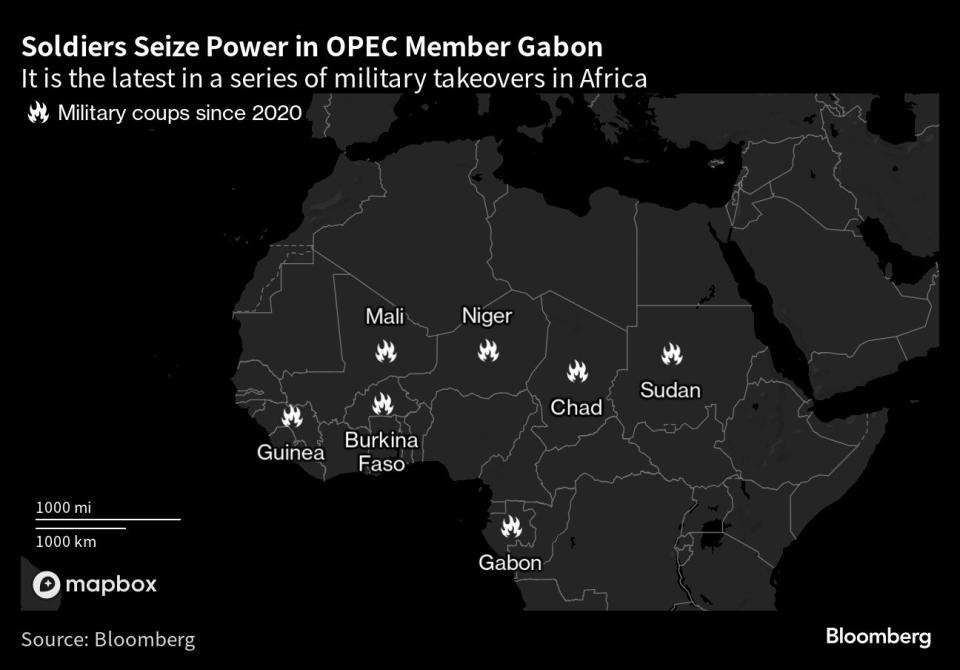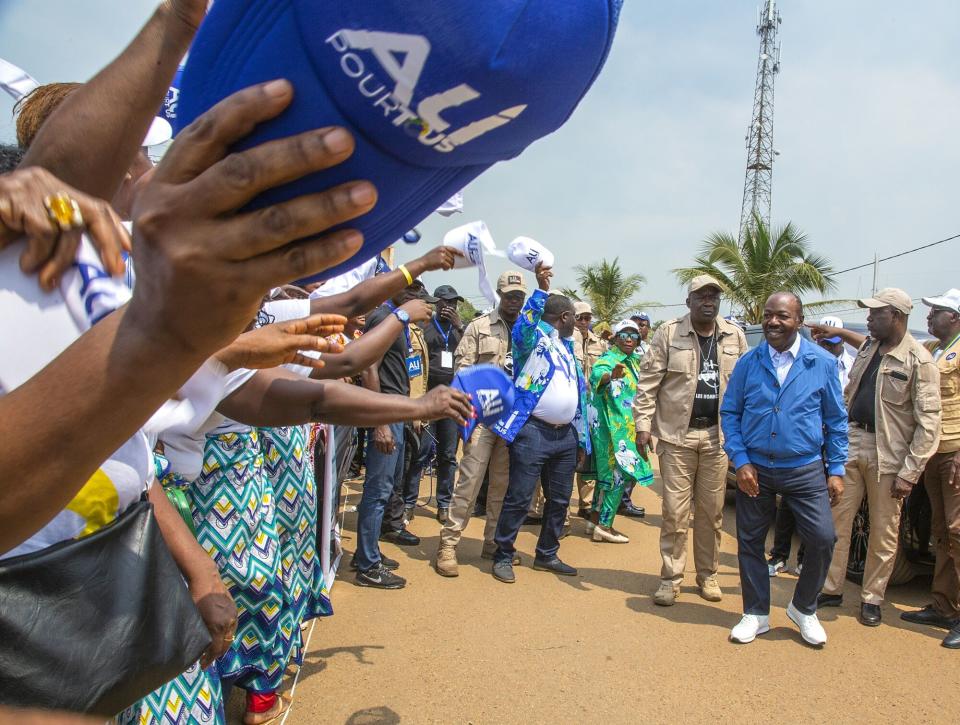Gabon Military Officers Take Power in Latest Coup to Hit Africa
(Bloomberg) -- Soldiers seized power in OPEC member Gabon, four days after the central African nation held disputed presidential elections. The nation’s dollar bonds sank.
Most Read from Bloomberg
UBS Flags Cost Cuts After $29 Billion Credit Suisse Windfall
Europe's Biggest Oil Company Quietly Shelves a Radical Plan to Shrink Its Carbon Footprint
Cathay Expects to Suspend Hong Kong Flights as Typhoon Nears
If the putsch holds in the former French colony, it would mark the ninth in sub-Saharan Africa in the past three years, and follows a coup in Niger last month. The military takeovers have been rooted in the economic malaise and weak governance that have fed frustration among civilians and — in West Africa in particular — the spread of extremist violence.
Army officers appeared on Gabonese state television early on Wednesday to announce they’d canceled Saturday’s vote and dissolved the country’s institutions. President Ali Bongo is under house arrest with his family and medical doctor, while one of his sons has been detained, the officers said in a separate broadcast.
Gabon’s dollar bonds due June 2025 and November 2031 were the worst-performing in emerging markets on Wednesday, with some analysts predicting the selloff may spill to other countries with high political risk. Shares in French mining group Eramet SA, oil and gas producer Maurel & Prom SA and a listed unit of TotalEnergies SE, which all have operations in Gabon, sank in Paris trading.
Read More: Europe Markets Reverberate From Gabon Coup as Bonds, Shares Fall
Gabon is different from other countries in the region — the oil producer hasn’t had to deal with jihadist attacks or spreading insecurity. But the ruling family’s grip on power has come under pressure in recent years. Soldiers launched a failed coup in 2019, months after Bongo suffered a stroke that sidelined him for almost a year.
Ex-colonial power France has maintained strong ties with Gabon, despite widespread concerns about its democracy and human rights record. President Emmanuel Macron visited Bongo in March, in a move widely seen as an expression of support.
The French government condemns the coup and is closely following events, a government official said in Paris. France is committed to free and transparent election processes, the official said.
France’s record of backing ruling families, dictators or presidents-for-life in the region in the name of stability has long been a source of a resentment in its former colonies. It has fed anti-French sentiment that has been exploited by coup plotters.
Read more: What’s Driving Coups in Niger and Across West Africa?: QuickTake
The putsch raises anxiety about a potential contagion of coups in Africa and increases pressure on regional bodies including the Economic Community of West African States to act to restore civilian rule in Niger, after the 15-nation bloc threatened to use military force to compel the military junta to relinquish power.
Macron warned on Monday that if the bloc doesn’t restore democracy, “all the presidents across the region are more or less aware of the fate that awaits them.”
White House National Security Council spokesman John Kirby said the US was closely watching the developments and had accounted for all its embassy personnel and troops in the country.
“I think it’s I think it’s too soon to call this a trend,” Kirby told reporters. “It’s obviously deeply concerning here — yet another country where military officers have taken these dangerous and reckless steps and attempted takeovers of democratically elected governments.”
Read more: Gabon Coup Brings Investors’ Focus Onto Oil Producers, Miners
The latest putsch also highlights the inability of the African Union to prevent military takeovers, said Charlie Robertson, head of macro strategy at FIM Partners UK Ltd. in London.
“The ineffective African Union has sat back and watched regime after regime topple in Africa and failed to reverse any of the coups in recent years,” he said. “The African Union needs to step up and take some responsibility for what’s happening on the continent, before the coup contagion spreads further.”
The African Union, which suspended Niger from all its activities following the coup in the West African nation, said it “strongly condemns the attempted” military takeover in Gabon, according to a post on X, the social-media platform formerly known as Twitter.
Gabon is one of OPEC’s smaller members, pumping about 200,000 barrels a day. The country has abundant oil and manganese deposits, but they haven’t translated into better living standards. About one third of its 2.2 million people live below the poverty line, according to the World Bank.
Read More: Gabon Shuts Off Internet, Imposes Curfew as Bongo Seeks New Term
Bongo was first elected president in 2009, four months after the death of his father, Omar Bongo, who had held power since 1967. He secured a second seven-year term in 2016 in the closest election in the nation’s history, and violence and looting ensued after his victory was announced.
The takeover was announced hours after Bongo was announced the winner of the election with 64.3% of the vote, according to AFP.
Fears have been mounting of a repetition of the unrest, with the US Embassy in Libreville, the capital, warning of the “possibility of protests throughout Gabon in the lead up to and aftermath” of the vote. The UK Foreign Office updated its travel advisory for the country, advising citizens to remain indoors.
“Our network of embassies in the region will be paying close attention to what we need to do and what we are able to do,” UK Foreign Secretary James Cleverly told Bloomberg in interview Wednesday during a visit to Beijing.
Bongo’s bid for a third term came months after Gabon’s constitution was changed to allow the president to be elected in a single round. The new system also obliged voters to choose their preferred leader and lawmakers from the same party.
--With assistance from Helen Nyambura, Colum Murphy, Kitty Donaldson, Baudelaire Mieu, Ania Nussbaum, Colleen Goko, Paul Wallace and Jenny Leonard.
(Updates to add US official’s comment from 11th paragraph.)
Most Read from Bloomberg Businessweek
©2023 Bloomberg L.P.

 Yahoo News
Yahoo News 


